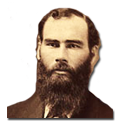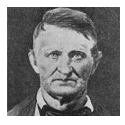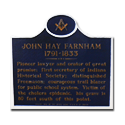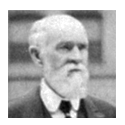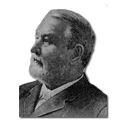John Hay
(1838-1905)
John Hay was born in Salem an became an American statesman, diplomat, author, journalist, and private secretary and assistant to Abraham Lincoln. Hay's highest office was serving as United States Secretary of State under Presidents William McKinley and Theodore Roosevelt.
Benjamin Franklin Trueblood
(1847-1916)
Trueblood was born of Quaker parents on November 25, 1847 in Salem. Trueblood graduated from Earlham College in 1869 and would later become the iconic leader of the American Peace Society based in Boston. Upon his death in 1916 it was stated that "He was truly a great man; a man who gave his life for a noble cause, the cause of Peace. In the generations to come Dr. Trueblood will be looked back upon as one of the World's greatest thinkers, one of the men who live for their fellowmen, the men who have a vision which most people cannot have."
Everett S. Dean
(1898-1993)
Born in nearby Livonia, Dean played basketball for three years at Indiana University and was named the 1921 Helms Athletic Foundation All-America team. Dean has the distinction of being the first basketball All-American from Indiana University.
Dean later became the head baseball and basketball coach at Indiana University. In 1938, Dean was named head basketball coach at Stanford University. Dean coached the 1942 Stanford Basketball team to a NCAA Championship. Dean was also named baseball coach at Stanford in 1950, and led Stanford's baseball team to the 1953 College World Series.
Dean is the only coach inducted in both the Naismith Basketball Hall of Fame and the College Baseball Hall of Fame. He was inducted into the Indiana Basketball Hall of Fame in 1965.
Isaac Blackford
(1786-1859)
After graduating from Princeton University, Blackford came on horseback to the Indiana Territory to practice law. In 1812 Blackford arrived in Salem, where he worked as Washington County’s first clerk and recorder before being elected Clerk of the Territorial Legislature in Corydon in 1813.
Blackford was Indiana’s longest-serving Supreme Court justice and the author of the Blackford's Reports detailing the state’s first court decisions.
John Hay Farnham
(1791-1833)
John Hay Farnham was a Harvard educated Attorney that arrived in Salem to practice law in the 1820's. At the 50th Anniversary of American Independence Farnham made a controversial speech to Salem Residents. Farnham lobbied residents for increased taxes to pay for "common schools" in Salem. The residents of Salem could not follow the justice of taxation on their own property for the education of children of those residents who had no property for taxation.”
Farnham later became the first Secretary of the Indiana Historical Society. He is buried in Crown Hill Cemetery in Salem.
Ladies Piano Club of Salem
(1896)
The Ladies Piano Club of Salem was one of the earliest female social organizations in the state. The social club brought an appreciation for music to the women of Salem.
Lee Wiley Sinclair
(1836-1916)
Sinclair built the largest woolen mill in southern Indiana in Salem. Sinclair also expanded his holdings to another textile mill in Chicago and a department store in Salem.
Thomas Jackson Rodman
(1816-1874)
Rodman was born on a farm near Salem. He was an artillerist, inventor, ordnance specialist, and career United States Army officer. He served as a Union Army general during the American Civil War. Rodman is especially remembered for developing the Rodman gun, which in various sizes saw extensive use in coastal defenses, and was called the "strongest cast iron cannon ever made."
General Rodman also discovered the use of shaped gunpowder grains, in which properly compressing and shaping the gunpowder into pre-designed grain shapes allowed the control of gas production by the burning gunpowder. This resulted in increased muzzle velocities with lower maximum pressures when compared to performance with conventional ball powder. The Rodman seven perforation grain was named after Rodman, and similar propellant grain shapes are still in use today in artillery, rockets, and automotive airbag inflators.
Washington C. Depauw
(1822-1887)
DePauw was born in Salem in 1822 and went on to build a fortune by investing in ventures such as grain, steel and glass and later supplying these items to the US Government during the American Civil War. At one time DePauw was considered the wealthiest man in Indiana.


